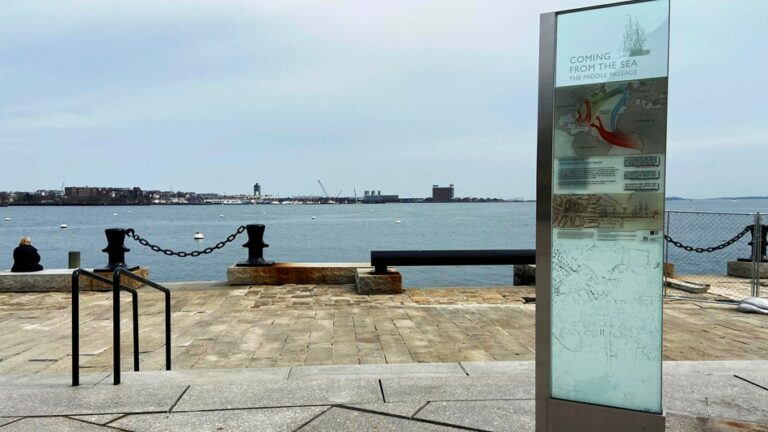The Middle Passage and the Slave Ship Desire

When the Desire sailed toward Boston in February 1638, her captain William Pierce had to navigate the difficult and unfamiliar channels past the Harbor Islands. Europeans had only colonized the area seven years prior, and Boston Light, the primary navigational aid in the harbor, would not be built for another 70 years.
But on her return voyage to New England, Desire carried another type of cargo; Africans, not captured in battle but sold to European traders as chattel slaves. The men and women the ship carried were purchased from plantations in the Caribbean, the place where the Pequots were taken to be sold to work the sugar plantations.
The entry of the Desire into Boston Harbor in February 1638 would make the first time enslaved Africans would be brought to Boston; just 19 years after the first enslaved Africans were brought to the American colonies in Jamestown.
Over the next 150 years, an estimated 166 transatlantic voyages began in Boston.Over 1000 ads in local newspapers advertised the sale of these Africans brought back to Boston, continuing until 1783, when a Massachusetts court case put an end to the trade.
In 2011, an organization called The Middle Passage and Port Markers Project was founded to honor those who perished during the crossing from Africa to America; an estimated 2 million, and those 10 million who survived and whose labor was instrumental in building the Americas.
On August 15, 2015, many in Boston came to terms with this sordid history through a ceremony in Faneuil Hall to acknowledge the first Africans who were brought to Boston. Five years later a “port marker” was placed at the end of Long Wharf, facing east toward Africa. On August 29, 2021, a special ceremony was held to officially dedicate the “port marker.”
However, as evidence by the outward voyage of the Desire in 1637, Africans were not the only people sold into slavery within the New England colonies. Native people captured in several colonial wars (including the Pequot Wars, 1635-36 and King Phillips – aka Metacomet’s War , 1675-76 were transported to the Caribbean – especially New Providence in the Bahamas where Boston had direct ties. This would be the fate of many people of the local tribes associated with the Harbor Islands, including the Massachusett.
Follow the link below to a video of that ceremony, opening with the land acknowledgment of the Massachusett people, who inhabited the land to which the Africans were first brought in 1638 and thousands of years before. https://www.youtube.com/watch?v=Ff0WVvn_FDI
Reference:
www.nps.gov/boaf/middlepassage
Desire Lines: From Slave Ships to the 9th Ward by Brenda Quant. www.lithub.com
http://www.massmoments.org. February 28, 1638. First Slaves Arrive in Boston